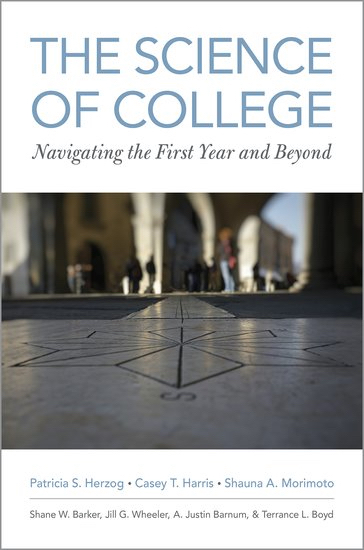What does it mean to be a college student and young adult in today's society?
That question is at the heart of a new book, The Science of College: Navigating the First Year and Beyond, written by a team of researchers, professors, advisors, recruiters and higher education professionals at University of Arkansas.
The Science of College looks to aid entering college students and their support networks in navigating college successfully, with up-to-date recommendations based on real student situations, sound social science research and the experiences of authors Patricia S. Herzog, Casey T. Harris, Shauna A. Morimoto, Shane W. Barker, Jill G. Wheeler, A. Justin Barnum, Terrance L. Boyd and their colleagues.
"The transition to adulthood is a complex process — especially now during the COVID-19 pandemic — and college is pivotal to this experience," said Casey T. Harris, an associate professor in the U of A's Department of Sociology and Criminology and co-director of the Center for Social Research.
 "The book highlights common issues that many students face and provides science-based advice for how to navigate college. Each topic covered is geared towards the life stage that most college students are in: emerging adulthood," he said.
"The book highlights common issues that many students face and provides science-based advice for how to navigate college. Each topic covered is geared towards the life stage that most college students are in: emerging adulthood," he said.
Harris said the book does this by addressing the changing needs of incoming college students based on their demographics and social background; challenging preconceived and outmoded understandings of career pursuits; interrogating diversity in college settings along class, race, and gender lines and other areas of difference; and empowering students to identify and make use of campus resources.
The stories captured in the book also highlight how the challenges that college students encounter vary in important ways based on who they are and where they come from. And how, despite these varied backgrounds, all students are more likely to have successful college experiences if they invest in their communities.
"Universities have many resources available, but students need to learn when to access which resources and how best to engage with the people serving students," Harris said. "This includes having a better awareness of the different roles held by university faculty and staff, and navigating who to go to for what, based upon understanding their distinct sets of expertise and approaches to support."
Additionally, the book includes appendixes with activities for students, tips for parents, and methods information for faculty. Supplemental website materials also suggest classroom activities for instructors who adopt this book within first-year seminars and general education courses.
"We think the work we've done is very important and are hoping that others across our university and beyond will think so, as well — and maybe even adopt the book for their own classes!" Harris said.
The Science of College: Navigating the First Year and Beyond is an open access title available under the terms of a CC BY-NC-ND 4.0 International license. It is free to read at Oxford Scholarship Online and offered as a free PDF download from OUP and selected open access locations.
The Fulbright College of Arts and Sciences' Fulbright REVIEW publication had a few more questions about the book, which Harris and the author team answered online.
Topics
Contacts
Andra Parrish Liwag, director of communications
J. William Fulbright College of Arts and Sciences
479-575-4393,
